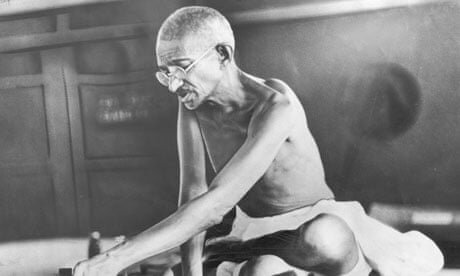The Man Who Blinded The World
“Ankh ke liye ankh, puri duniya andhi ho jaye gi”
“An eye for an eye, and the whole world may go blind”
These words echo in the annals of India’s colonial history, one of frivolous religious wars and self determined sovereignty. However the man who uttered these words, the man who is credited as the “Father of the Indian Nation,” who is worshipped, may have left the world blind to his own evils.
Mohandas Karamchand Gandhi was an enigma, admired for his philanthropy and ahinsa in order to find the rebirth of his county. His life was riddled as an anthology of racism, greed, misogyny, and being a perpetuator of what eventually became the Brahmanical Patriarchy. Having this disposition of a man who is worshipped as a God, is nothing less than controversial, however given the nature of women achieving the audacity to tell their stories, true justice is in telling the stories of a man who had repressed sexual interests of a deviant in society.
On the topic of sex, Gandhi advocated for chastity and a life distanced from lust, spending his time in South Africa advocating for the former and idealizing punishment of sex and “lustful urges.” His relationship with sexuality was a destructive one, blaming himself for urges and justifying his relationship with his young victims since they were at his very beck and call, framing them as willing and subservient.
Gandhi’s history with experimentation found its roots in his idea of his chastity. Gandhi wanted to test the very limitations of his urges. Under the veil of dispising lust, Gandhi used his saintly influence to make it appear as it was only a guilty pleasure. Although Gandhi preached the dangers of lust, he himself succumbed to it in a pattern of predatory nature. An article published in the Guardian, entitled, women suffer from Gandhi's legacy, states, “He believed that sex was bad for the health of an individual, and that carnal freedom would lead Indians to failure as a people.” His fear of sexual empowerment also directed his opinion on women in general, viewing his wife as the object of his lust, subjecting her to psychological torture by punishing her for his sexual urges. On the topic of menstruation, as recorded by Rita Banerji in her book Sex and Power, “he believed menstruation was a manifestation of the distortion of a woman's soul by her sexuality".
Shamefulness was even more pronounced when Gandhi and Jawaharlal Nehru led a campaign of “Sexual Cleansing” wherein, they enforced the erasing of any homoerotic or suggestive homosexual art in Hindu temples, creating systems that denied a substantive part of Hinduism as a whole. This translates further into the Brahmanical Patriarchy, or a system that uniquely presents itself in India as a result of the Hindu caste system and the interpretation of Hindu texts to disadvantage women, femmes, trans individuals, and any non binary members of community. In fact, as he brags in his later writings, when he was on mission in South Africa and found himself confronted with a young man harassing a couple of his female followers, in order to “sterilize the sinner’s eyes,” he cut the girls’ hair. This blatant victim blaming weaponized masculinity, creating an entity that women should be afraid of and subordinate to. Additionally, in the same Guardian Article, it states, “Gandhi believed Indian women who were raped lost their value as human beings. He argued that fathers could be justified in killing daughters who had been sexually assaulted for the sake of family and community honour.”
Gandhi’s sexual experiments were a manifestation of his repressed urges under the guise of disgust. These experiments consisted of children, young boys and girls who he took to his ashram. In his accounts, this ashram was a paradise of naked children who played games and helped Gandhi find his chastity. He also requested girls to aid in his bathing, and although sexual thoughts and actions were punished, he was excused. Sushila Nayar was one such child, who bathed and slept with Gandhi, which for many children happened in the nude. On his account of Sushila he states, "While she is bathing I keep my eyes tightly shut. I do not know ... whether she bathes naked or with her underwear on."
The true victims of Gandhi’s crimes, the young girls and boys he tested his chastity with, may be lost to history or glamorized to frame Gandhi as a misunderstood being. These children were subjected to the “grace” of a powerful figure, one they never had a need to doubt as he was their teacher and saint to whom their mothers looked up to. They were willing, willing to trust and follow this man promising them freedom and redemption. Willing, to follow their mothers pleas. Willing, to be subjected to games they never knew they could play. What this narrative forgets is a child's willingness is not consent. These children will forever be remembered as those who frolicked on chastity even if their realities consist of trauma and praying on their innocence. I urge you to learn more about this man romanticized by colonized history. Learn about a man in power, using his influence to seek out the meek and manipulate them to acts they have no way of protecting themselves from. One who utilized the trust in him to break all social contracts and play his wretched games. That man is Mohandas Karamchand Gandhi, the father of the Indian Nation, an enigma in society. You choose now how to cement his legacy.

